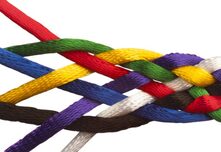weekly column
|
Each week, find a commentary on something connected to verses of Torah or another source of wisdom
|
|
Each week, find a commentary on something connected to verses of Torah or another source of wisdom
|
 The Numbers:13 Project of Zerah, the clan of the Zerahites; of Saul, the clan of the Saulites. Numbers 26:13 I know I am giving away both my age and my sense of humor when I mention Allan Sherman. The spiritual mentor of Weird Al Yankovic, Sherman elevated the song parody to a national phenomenon. He mostly (in his early work) parodied the songs of the first half of the twentieth century – not surprising, since he grew up then. I knew most of the originals from the parodies. Songs like “You Went the Wrong Way, Old King Louis” and “Streets of Miami” made such an impression on me that I was surprised to learn there were original lyrics. (I had to ask my parents what was so funny about the line “he was trampling through the warehouse where the drapes of Roth are stored,” a skewer of “The Battle Hymn of the Republic.”) But no song tickled me as much as “Shake Hands with Your Uncle Max.” It is a riff on “Dear Old Donegal,” an Irish pop tune about a man who returns to Donegal after trying out America and is reintroduced to his neighbors Branigan, Flannigan, Milligan, Gilligan and all sorts of others. But I never heard the original until much later. Instead, I committed to memory the Allan Sherman version about a salesman who returns to Brooklyn (so that’s where Ocean Parkway is!) after his long and lonesome season on the road. His mother is there to reintroduce Levin, Levinsky, Levine and Levi…Stein with an "e-i" and Styne with a "y." Aside from being a play on the Irish ditty, the song is a not-so-subtle reference to the proclivity of Jews (and others, I suspect) to try to draw connections with people they meet. Stand near two Jewish strangers at a social gathering and eventually you will hear an exploration that begins either with “do you know” or “are you related to.” My last name is pretty unusual in the Jewish community (but familiar to Swedes), so it’s not so farfetched for someone who knows my siblings or cousins to ask me if I am connected to another Moline. But Stein with an “e-i” and Styne with a “y” (from Brooklyn) can provoke an adventure of six degrees or fewer of separation. Maybe this behavior is a benign parody of the long section of the second census in the Book of Numbers. The twelve tribes of Israel are called by the name of their patriarchs, and afterward the then-current chieftain and then his sons. The families (clans) of the sons are each noted by the name of the current patriarch. Those descended from Zerah, the Zerahites. Those descended from Saul, the Saulites. Well…duh. The tribes had their territory and the clans had their homesteads. The merchant who returned with his caravan could shake hands with his Uncle Zerah and meet cousins from other tribes – Naphtali, Issachar, Judah and Gad. Jewish geography may not be quite the modern phenomenon we think it is. A well-known rabbi, so well-known that I won’t identify him, once said that the only false words in the prayer book are chaveirim kol yisrael, which means (a little too literally) “all Jews are friends.” But taking that notion more literally than it is meant brings me back to Allan Sherman’s song. He may not have been so happy to see cousin Isabel (that’s Irving’s oldest girl) or the Tishman twins, Gerald and Jerome, but they all came out to greet him and to wish him welcome home. Maybe that’s part of the intrigue of the DNA-mapping technology that various companies market. So far, my sample has identified 1216 relatives, about five of which I knew about. Sooner or later I will find out if I am a Zerahite or a Saulite or any of the other -ites who left Egypt. (I already know I am 99% Ashkenazi Jew.) Until then, are you related to……?
0 Comments
 The Numbers:13 Project It shall be for him and his descendants after him a pact of priesthood for all time, because he took impassioned action for his God, thus making expiation for the Israelites. Numbers 25:13 When I think about all the people I knew when I was a kid, it is pretty amazing to me how many of them had parents – fathers, most usually – who were businessmen. In the small neighbor where I grew up, there was a doctor, a cop and an ad exec, but mostly the dads owned businesses. Our middle-class community depended on the market for glass containers, lighting, kosher meat, uniforms, gemstones and, in our family, office supplies and furniture. Almost all of my friends went to college and almost none of them entered the family business. Some (like my sister) tried for a while, but most (like my brother and me) never had much interest in the “shop.” I never did a scientific survey (nor even an unscientific one), but my two grandfathers made their way through this world working with their hands, and their children showed no particular interest or aptitude for that aspect of securing a livelihood. I am certain that you live in circumstances that benefit from my grandfathers’ trades, but I am equally certain almost none of you have contemporaries who followed in their footsteps. The notion that children would follow their parents into the family business used to be pretty usual. You only need to look to the last names conferred on families with working-class origins when surnames began to emerge to know how prevalent it was to be defined by the family business. Smith, Porter, Wagner, Carpenter – these are very transparent English names. Schechter (butcher), Schumacher (cobbler), Weiner (vintner), Dayan (judge) are names common in the Jewish community with origins in European languages. (Of course, there are other origins of surnames. Slaves often had their enslavers’ names imposed on them. Many cultures, including Jewish culture, used the name of a family elder as the last name. Geography often identified a family. And so many others.) The process of choosing a profession has changed multiple times over the thousand years or more of identifying family names. But it is a pretty radical notion to consider that my livelihood could be defined by family heritage. My ancestors landed on these shores with the surname “Melamedmen.” It is a Hebrew-Yiddish mash-up that means, literally, “teacher-man.” In the hierarchy of Jewish scholarship, the “teacher-man” was a generalist, usually providing the foundation of basic Jewish literacy to children. While we have plenty of Jewish educators in our extended family, none of us wound up in the (honorable!) profession of teaching Bible to fourth-graders. Speaking of the Bible, I imagine the “pact of priesthood for all time” mentioned above seemed like a pretty sweet deal back then. For certain, the responsibility of tending to the ritual life of the people by maintaining their right relationship with God was profound. But the priests were sustained by the rest of the people (as part of their home tribe of Levites) and enjoyed the privileges of office. They were limited in their choices for marriage and could not own real property, but the family business was secure and sustained. But “all time” continues today. The designation of “priest” is preserved among the Jewish population by surnames that are remarkably accurate, diluted though the lineage may be. Any variation of Cohen, Kahn or Katz (an abbreviation of “righteous priest”) indicates a legacy of priesthood. Unless the name was adopted to replace an undesired surname, anyone whose family legacy includes this name is in some way presumed to be in the pact of priesthood for all time – the family business. We live in an entrepreneurial world. Though work has undeniable dignity, the notion that you are assigned a form of labor by something or someone external to your own efforts is the stuff of tyranny or dystopian novels. My parents and grandparents were proud of the family businesses, but they never expressed the expectation that any of their offspring would follow in their footsteps. I carry a title that reveals my career choice to the world. I can’t tell you how many times I have been asked if any of my children were going to follow me into the rabbinate, the “family business.” I never responded as many rabbis do with “I hope so” or as some rabbis do with “I hope not.” They followed the values they learned from my wife and me and have found a way to serve and sustain, each in their own idiom, as the generations did before them. Our American culture sometimes tries to assign expectation to the children on the basis of their parents’ professions. In entertainment, politics, big businesses and sports especially, a marquee name is not only bankable, but definitive. But having a parent who was a senator, a point guard or a real estate magnate is no guarantee of anything other than fame. There are no more pacts of profession for all time.  The Numbers:13 Project ‘Though Balak were to give me his house full of silver and gold, I could not of my own accord do anything good or bad contrary to the LORD’s command. What the LORD says, that I must say.’ Numbers 24:13 What constitutes integrity? I try not to get too theological in these columns, but sometimes it is unavoidable, as you will see. I have always imagined integrity to be connected to integration, which is to say, the opposite of compartmentalization. I think it is impossible to live life without some measure of cordoning off certain experiences from others. I learned it as a rabbi a long time ago on the day I walked from one room in the synagogue where I conducted the naming for the first child and granddaughter of a multi-generational family to another room where I conducted a funeral after the sudden death of a young father of two toddlers. The emotion in each room could not have been different, but I could not afford to be swept away by either joy or grief. The contrasts in our lives are not always that severe, of course. Yet, some measure of separation between work and home, responsibility and indulgence, birth and death, reaping and sowing, embracing and refraining from embracing -- you know the list -- is the experience of everyone who has been around the block even just once. Still, the person who segments every experience and lives always and only in the moment seems (at least to me) to live without integrity. Integration involves connecting the various aspects of any system (in our case, a life) into some kind of comprehensive and comprehensible whole. As a person of faith, I have one more criterion I think cannot be overlooked. Lots of folks find a way to knit together the parts of their internal landscape as they process their sojourn through life. Using the compass of conscience, however defined, or of self-interest (in its extreme expression known as narcissism), they mistake self-satisfaction for integrity. People whose sense of integrity is limited to what happens inside themselves are guilty of compartmentalization writ large. The person of integrity is connected with something larger and external. For me, that’s God. I am not smug about that faith (nor even the version of it to which I adhere), but I believe deeply that anyone who answers to no standard but an internal standard is, in the end, a scoundrel. The reason: every decision, most especially those we like to call “moral,” is based on serving the self. It is not necessarily the case that the self-serving moral decision is bad or wrong -- not everyone is completely selfish -- but it is not transferable to other people who do not share the same internal landscape. Which, of course, is everyone else. We are living in times in which integrity is pretty easily compromised. The parade of public figures who seem to have traded their principles for access to power or money (mostly to find themselves exposed and/or under a bus) is constant. You do not need to subscribe to the external values to which an individual has pledged allegiance to feel the pain and disappointment when integrity has disintegrated. Compulsively clinging to that external standard comes with its own set of problems, but letting it go entirely almost always leads to tragedy, whether it is misconduct, opprobrium or plain old loneliness. The oft-maligned Bilaam (aka Baalam) seems to appreciate this truth when he is offered a fortune to use his oracular talents to condemn the Israelites. He is, at least at this moment, a man of integrity, that is, answering both to his internal and external values. It is a high point in his life (which precedes the low point -- being outsmarted by a talking donkey). He is not an Israelite/Jew, which teaches the lesson that integrity is not tribe-dependent (and allows the Bible to make his fall less personal to Jewish readers). Maybe some other time I will muse about how to balance the internal compass and the external standards. For the moment, I will stop with the suggestion that adage “no one is an island” should inspire us not only to intertwined relationships, but also to a life of integrity,  The Numbers:13 Project Then Balak said to him, “Come with me to another place from which you can see them—you will see only a portion of them; you will not see all of them—and damn them for me from there.” Numbers 23:13 There is no question that some individuals arrive at the border of the United States with malice in their hearts. They may have contraband to smuggle – drugs especially. They may be bringing children or young women to the border with the promise of a better life but the reality of being trafficked. They may have exacted exorbitant sums of money from other people hoping to avoid immigration authorities by crossing illegally. I wouldn’t defend them, and I won’t defend them. They should be prevented, apprehended and/or prosecuted, as they deserve. There is no question that some African American, Latinx, Hispanic and Asian individuals (and others) belong to gangs. They may be willing to tolerate or engage in criminal or anti-social activities. They may intimidate neighborhood residents or members of other gangs. They may seek to pressure recruits to join or to turn away from family and friends. If they cross a legal line, they should be held liable for the consequences, as should anyone. There is no question that some wealthy business people have gotten rich through illegal or immoral activity. They may have laundered money or concealed it from taxes in offshore accounts. They may have engaged in price gouging, price fixing or bait-and-switch pricing. They may have persuaded people to entrust them with their own money and then violated that trust. No matter how genteel these crimes are, they should be investigated thoroughly and prosecuted to the full extent of the law. The transgressions of any subset of any demographic segment must not be used to typify the population of similar individuals. Politely, we call that stereotyping. Less politely, we call that bigotry. If I suggest that sometimes stereotyping is an understandable reaction, it is not to justify it, but to recognize that when the only thing someone knows about an entire cohort is the actions of a few, extrapolating to the larger population is an understandable (if illegitimate) reaction. And certainly, if culture has not evolved to encourage wiser and more humane response, there is hard work to be done. Native Americans, LGBTQ individuals, immigrant populations from the Irish to the Guatemalan, and, most notably, African Americans have suffered from a proclivity of Americans of privilege to “other-ise” minorities. Education and personal relationships are the most effective correctives to bigotry borne of ignorance. Sometimes, however… Sometimes there are people of genuinely bad will who seek to create a frame around others that purposely casts them in the most negative light for the general population. Take Balak, the self-proclaimed enemy of the Israelites who was intent on bringing down a curse on the liberated slaves. He promised a prominent religious figure, Bilaam (often called Balaam in English translations), wealth and access to power if he would attempt to marginalize the Israelites with an imprecation. Bilaam found himself drawn to praise at the wide expanse of the nomadic encampment. Balak suggests the ancient equivalent of cropping a photo, taking Bilaam to a vantage point that obscures most of them and diminishes their presence. Maybe at that point Balak encouraged Bilaam to see criminals and rapists and drug dealers with calves the size of cantaloupes. Perhaps he called them roving bands of violent criminals roaming our neighborhoods. It could be he suggested that they wanted to bleed his country dry as their financial dealings were the equivalent of getting away with murder. And who knows – maybe from that promontory the visible section of the camp looked sinister and dangerous. Maybe it was a persuasive case to someone otherwise uninformed. It didn’t work then, and it shouldn’t work now. Embracing those who differ from us does not mean ignoring the shortcomings of those who do not respect the law, just as we ought not overlook those most like us who do the same. And acknowledging the shortcomings of the minority of the minority does not mean generalizing to the majority of the minority. Any religious figure who is seduced by wealth and power to do what is wrong in the eyes of his or her faith is a fraud. Any public figure who seeks to isolate an entire community by a sweeping judgment on a small subset is a bigot. And anyone who falls for those tactics has chosen ignorance over righteousness.  The Numbers:13 Project Balaam arose in the morning and said to Balak’s dignitaries, “Go back to your own country, for the LORD will not let me go with you.” Numbers 22:13 A long time ago, when gentle ethnic humor was still funny, there was a joke which was told about an immigrant – alternately Eastern European Jewish, Arab or Indian – who was sued by an African American for verbal assault. The judge asked the complainant what happened. “Your honor,” he stated, “I was walking down the street looking for a particular restaurant. This gentleman was walking toward me, so I asked if he could direct me to the establishment. In response, he pointed at me and said, ‘You’re a black bastard. You should go back where you came from.’” The judge said to Mr. Epstein/Ahmadi/Singh, “Sir, I am surprised at you. You have come to this country and been treated as family, without regard for your country of origin. How dare you invoke one of the worst statements of bigotry imaginable!” The defendant replies, in the accented English he worked so hard to master, “Excuse me, your honor, I believe I was misunderstood. This gentleman was walking in the wrong direction, already beyond his destination. All I did was point the right way and say, ‘You’re a block past it. You should go back where you came from.’” I haven’t re-piloted this joke in live performance, but I am guessing it wouldn’t get too many laughs today. Instead, I would be met with a furrowed brow, a sigh and perhaps a remark about my own latent prejudices. Laughter is good for the soul and also for the body. The reason we laugh is not well understood, but not for lack of trying. Theories include the Ontic-Epistemic approach, the Computational-Neural approach and Benign Violation (which is likely considered oxymoronic these days), among many others. I have always subscribed to the notion that laughter comes at the sudden realization of the unexpected, a definition also used for epiphany, which I find delightful. But this much is true: if you have to explain it, it’s not funny. And if you explain why something ought not to be funny, if laughter isn’t a casualty, a relationship very well might be. What we are left with, if we want to laugh, is not so much humor as outrageousness. Albert Brooks, long one of my favorite comedians, has an old routine about being unable to generate laughs at a concert until he deployed the s-word. After that, he says, they wanted to put up a statue of him in the town square. Since then, the use or inference of profanity has become an almost necessary ingredient in humor, not including the benign violation caused by Dad Jokes. Humor always depends on insult or injury, but not really. The depiction of someone slipping on a banana peel should provoke concern or empathy. A word manipulated into a pun deceives the listener who insists on being literal. Even a game of peek-a-boo with a toddler plays on the child’s perception that something has suddenly disappeared and reappeared which is, of course, false and therefore a cruel exploitation of inferior cognition. Humor can be cruel if deployed with cruelty, and laughter “at” rather than laughter “with” can conceal the intent to bully. But laughter is also the most potent force in combating oppressive behavior and defusing the fear it produces. The aggressive way in which public provocateurs are lampooned in society today – by late-night comedians, by caricature balloons, by fighting Twitter with Twitter – is the only alternative to bile and brimstone until the next election. In my life and community, it is a familiar tool in the box, used in the past and present against medieval kings, petty tyrants, genocidal maniacs and physical disease. Laughter does not need to be licensed or registered and has a negligible record of fatalities, despite the undocumented claims of those who have “almost died laughing.” The little phrase from the little verse from this little column is not, in and of itself, funny at all. But when it is lampooned in the little joke, it loses its power and its offense. Lots of people have been injured by the challenge to go back where you came from. Defusing it can reduce the sting. So, among the many things of genuine consequence that deserve condemnation and resistance having spewed out of the mouth of the insulter-in-chief, let me add my trifle. He recklessly spoiled a useful and perfectly good joke. |
Archives
October 2023
Categories |